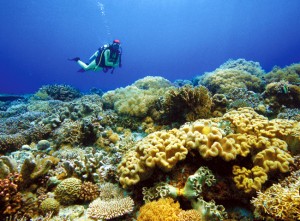The Philippines’ Tubbataha Reef was recently recognized by an international policy research body for the excellent care of the heritage site, hailed as a model in coral reef conservation.
The World Future Council gave one of two Silver Awards to the Tubbataha Reefs Natural Park Act, the policy measure that created a protected marine sanctuary of almost 100,000 hectares of high-quality marine habitats containing three atolls and a large area of deep sea.
The Tubbataha Reef, which sits in the center of the Sulu Sea southeast of Palawan, is located within the Coral Triangle, a global focus for coral biological diversity. It is home to a wide diversity of marine life and is a popular dive site.
World Heritage Site
It was declared a World Heritage Site by the United Nations Educational, Scientific, and Cultural Organization (Unesco) in 1993. It is administered as part of Cagayancillo, Palawan, and is under the protective management of the Department of National Defense.
In a statement, the World Future Council lauded the Tubbataha Reefs Natural Park Act for ensuring the effective management of the Unesco World Heritage Site.
Model in conservation
“Tubbataha has demonstrated that with carefully planned management, local communities need not bear the burden of closed protected areas, but can be their primary beneficiaries; as a nursery site for fish, the reef supports local artisanal fisheries,” the council said.
The World Future Council also praised the management of the Tubbataha Reef by local authorities and nongovernment organizations, citing the excellent condition of the reef compared with neighboring sites.
“The Tubbataha Reefs Natural Park Act has been hailed as a model of coral reef conservation and already similar legislation has been enacted in the neighboring Apo Reef,” the statement added.
The second Silver Award was given to Namibia’s Marine Resources Act of 2000 “for instituting an ecologically and economically viable fishing industry.”
Winning top honors was the Micronesian country of Palau, which received the Future Policy Award for 2012 for two outstanding marine policies, the Protected Areas Network Act, initiated in 2003, and its Shark Haven Act from 2009.
The World Future Council said the three winning countries “contribute most effectively to the sustainable management of the world’s oceans and coasts for the benefit of current and future generations.”
Leading by example
The winners were announced at a press conference recently at the United Nations headquarters in New York.
According to its website, the World Future Council is an international policy research organization that provides effective policy solutions for decision-makers.
“With the Future Policy Award we want to cast a spotlight on policies that lead by example. The aim of the World Future Council is to raise awareness for exemplary policies and speed up policy action towards just, sustainable and peaceful societies,” said Alexandra Wandel, World Future Council director.
The winners will receive their awards on Oct. 16 at the 11th Conference of the Parties to the Convention on Biological Diversity in Hyderabad, India.


